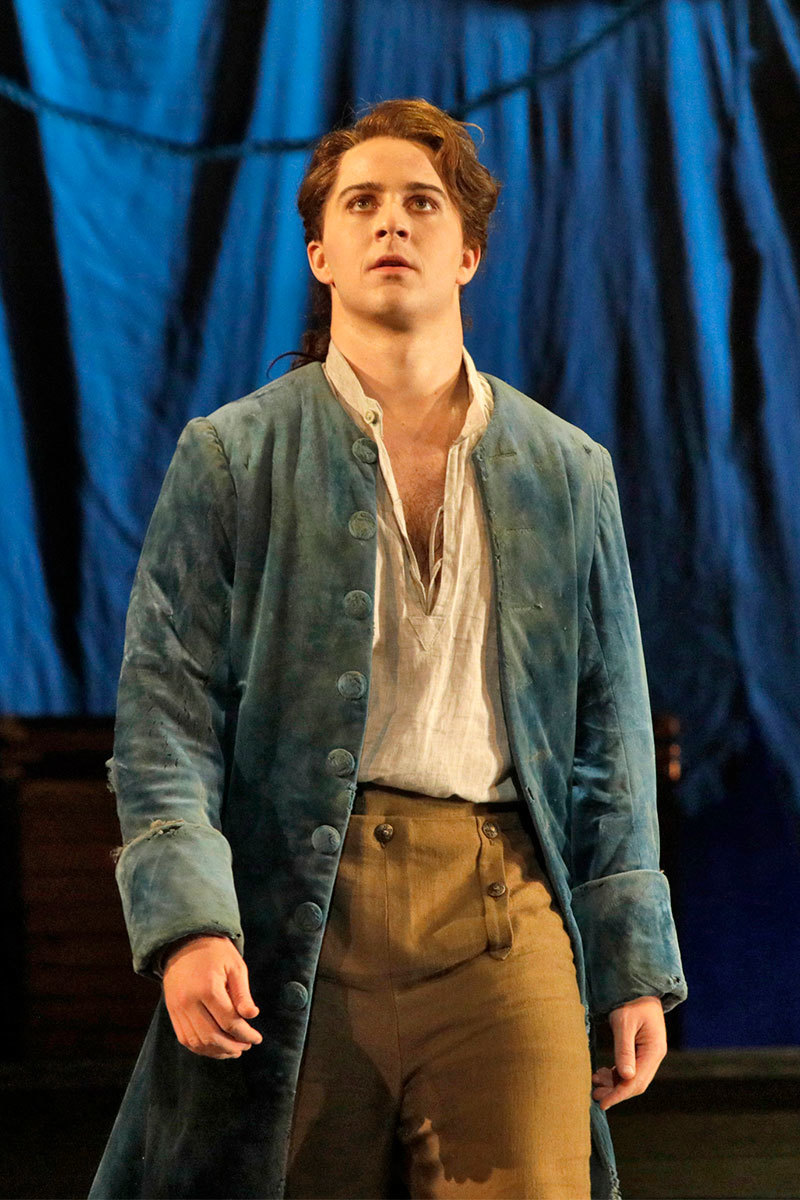Review: CANDIDE at Dorothy Chandler Pavilion
 Los Angeles Opera: Bernstein from Mahler to Mambo
Los Angeles Opera: Bernstein from Mahler to Mambo
CANDIDE is a 1950s operetta with music in a plethora of styles by Leonard Bernstein. His music literally runs the gamut from Mahler's sonorities to mambo rhythms. John Caird prepared a new version of the book Hugh Wheeler adapted from Voltaire. Lyricists Richard Wilbur, Stephen Sondheim, John La Touche, Lillian Hellman, Dorothy Parker, as well as the composer contributed to the libretto. Although scenes in this sprawling work of musical genius take place on two continents, director Francesca Zambello managed to focus the disparate scenes and make them into a performable show.
On January 27, 2018, Los Angeles Opera presented the Bernstein work at the Dorothy Chandler Pavilion with a cast that included Emmy-winning television star Kelsey Grammer. He is best remembered for his two-decade-long portrayal of psychiatrist Dr. Frasier Crane on the situation comedies Cheers, Wings, and Frasier. As Voltaire and Pangloss, Grammer had a huge speaking role that he acquitted with a commanding personality and considerable wit. Surprisingly, he sang quite well, too. Christine Ebersole is a star on Broadway, but she is also a trained opera singer, a fact that she proved beyond any doubt when she sang the role of The Old Lady. Portrayed by Ebersole, the lady is not old at all. It's just that, like one of Bernstein's own parents, she has come a long way from her ancestral home in Eastern Europe. As she says herself in a tango with klezmer overtones, "I am easily assimilated."
The version of the operetta seen in Los Angeles has already been staged at the Glimmerglass Festival. It will be seen at the Opéra National de Bordeaux and the Théàtre du Capitole de Toulouse. James Noone's scenery was generic enough to work for multiple settings. Mark McCullough's lighting provided the ambience that turned Noone's scenery into an effective background for each tableau. Since the set was bi-level, members of the huge cast and the chorus could sing from above when not actually needed to participate in the action on the stage below.
Jennifer Moeller's costumes provided eye-candy for the Chandler's almost-sold-out audience. Each outfit had an eighteenth century look, but most could also morph into something short and sexy for a showy number. Some of Moeller's long skirts came off to reveal shirred silk hot pants or see-through mini petticoats. As is true of many successful operettas, dance was an important part of this show. Choreographer Eric Sean Fogel created interesting and graceful moves that singers could perform while maintaining their necessary breath control.
This performance marked the most auspicious debut of lyric tenor Jack Swanson in the title role of Candide. Swanson will also be seen at Santa Fe Opera this summer. In Los Angeles he was a wide-eyed young man learning about life and all it had to offer, both good and bad. The title role is a long part and Swanson almost never left the stage. A marathoner rather than a sprinter, he never seemed to tire and turned in a fine portrayal.
Soprano Erin Morley is an artist of considerably more experience than Swanson and she made a charismatic Cunegonde. An innocent young girl at first, she gradually succumbs to plying the only profession left open to her. She learns to attract wealthy men and she revels in her jewelry collection. Midway through the first act, she performed a neo-striptease while singing the fiendishly difficult coloratura aria, "Glitter and Be Gay." Morley is one of those rare talents who can sing, act, and dance. She, herself, is a gem to be treasured.
Peabody Southwell was a sexy and amusing Paquette who sang with smoldering low notes while sonorous bass-baritone Matthew Scollin sang The Anabaptist and Martin the pessimist with a solid dark sound. Young Artist Program baritone Theo Hoffman created a character for Maximilian and sang his "Alleluia" with bronzed tones. Also in that program were Brian Michael Moore who appeared as the duplicitous Grand Inquisitor, Joshua Wheeker who was a commanding Cacambo, and Taylor Raven who excelled vocally and physically as the female seafaring pirate.
Chorus Director Grant Gershon's group not only sang with distinction, they danced like a Broadway chorus and changed musical styles with alacrity. The one artist who contributed the most to this show was conductor James Conlon. He not only led the orchestra, he wrote an article in the program, and gave the pre performance lecture. Now in his tenth year as Richard Seaver Music Director of Los Angeles Opera, he is the musical figure who holds this wide-ranging production together. Having grown up in New York in the fifties, Conlon is the perfect conductor to guide this orchestra through the many styles Bernstein used to suggest the travels of Candide and his friends. Sometimes Conlon was as much fun to watch as the singers. His complete absorption in the music and the joy he expresses in its creation are simply wonderful. Best of all, the accompaniment was substantial by an orchestra of close to fifty instruments. Los Angeles Opera's CANDIDE is a fabulous show. Go see it and enjoy!
Photo b y Ken Howard for Los Angeles Opera
Reader Reviews
Videos


